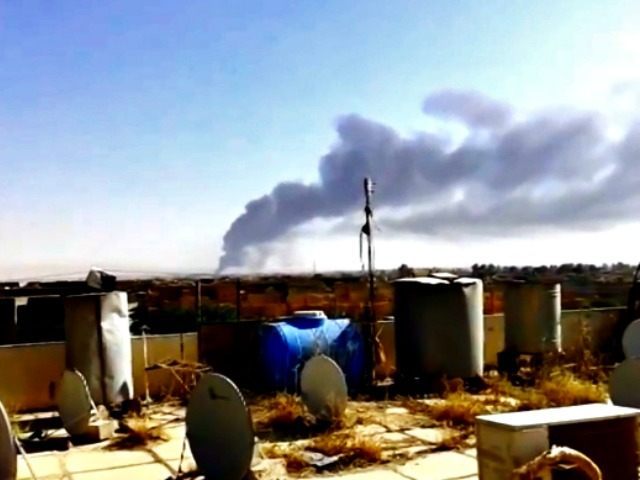Amid reports that the new strategy of hitting ISIS economic targets, including its cash reserves and oil infrastructure, is significantly harming the Islamic State comes a complaint from the Syrian government that it is harming them as well.
The Assad regime sent a letter to the United Nations in late December, just now made public by the Security Council, in which they complain about “ongoing attacks by aircraft of the so-called international coalition led by the United States of America against the oil and gas installations and the economic infrastructure of Syria, under the pretext that the target is the Islamic State.”
The letter cites three air attacks from December: the bombing of the Kubaybah oil terminal of the Kawkab Petroleum Company on December 8, the strike on the Markadah gas terminal of the Syrian Gas Company on the same day, and the bombing of the gas pipeline feeding the Dayr al-Zawr gas plant on December 13.
The Syrian government argues that the attack on Kubaybah destroyed an excessive amount of oil infrastructure, along with “the camp of the Chinese company that built the terminal,” while the Markadah strike was “unjustified given that it only processes raw gas,” rather than stockpiling oil that ISIS militants could steal.
A list of other air strikes from October and November 2015 is then provided, including a November bombing of Dayr al-Zawr that set some of the oil wells on fire.
“Aircraft of the coalition led by the United States of America have carried out dozens of attacks against Syrian economic facilities, instead of bombing ISIL and that group’s vehicles, which are transporting stolen Syrian oil to Turkey,” the Syrian regime complains. “The coalition has not presented any information in that regard to the United Nations, as required by the relevant Security Council resolutions.”
The letter goes on to claim that “the armed terrorist groups that are stealing Syrian oil and selling it illegally through Turkish channels are not stealing it directly from terminals, but rather at points near the oil wells throughout Syria’s oil fields.”
The regime concludes by saying the U.S. and coalition bombing campaign is “exacerbating the current difficult conditions in Syria.” This is followed by a demand under international law for “compensation from the States members of the American coalition for the damage they have caused.”
The Syrian regime has complained about coalition operations against the Islamic State in the past, arguing that such airstrikes “grossly” contravene Article 51 of the U.N. Charter (which obliges the U.N. to take steps against armed attacks on the soil of a member nation) and warning that “aggressive measures by the Western countries could spread chaos and wars in the world,” according to a September 18 report from Albawaba News.
In early December, the UK Express reported Syrian president Bashar Assad was “fuming” after U.S. airstrikes supposedly killed three Syrian soldiers on an army base. The U.S. military denied conducting operations in the area and said it was “certain” Russian planes dropped those particular bombs. The Islamic State has been extremely active in the area where the strikes occurred, carrying out a massacre and mass abduction there over the past few days.
The Syrian government has also complained that Russia’s alleged air campaign against ISIS hits a great many targets that have nothing to do with the Islamic State, an argument most Western analysts agree with. The Russians alternately admit and deny they are targeting non-ISIS groups.

COMMENTS
Please let us know if you're having issues with commenting.